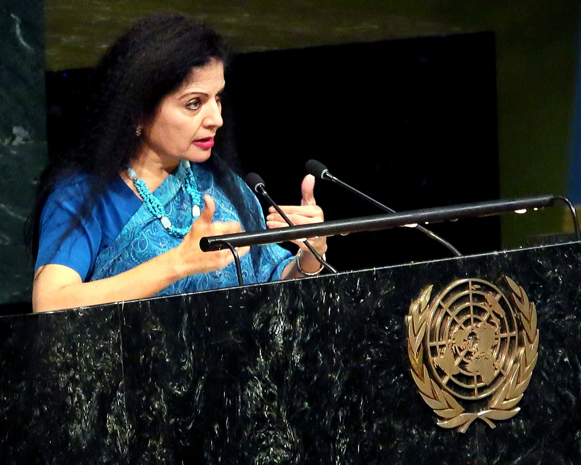
INTERVIEW BY PROF. INDRAJIT S SALUJA, CHIEF EDITOR, THE INDIAN PANORAMA
“The power of one is about passion, commitment and indomitable courage and keeping faith with the causes we serve no matter the difficulties and setbacks. It’s about not giving up ever.” Ambassador Lakshmi Puri, Assistant Secretary General & Deputy Executive Director UN Women, had said, receiving her Diwali Power of One Award at the United Nations on December 11, 2017. The only woman among five diplomats to be honored, Ambassador Puri made her resolve known: “I will power on believing in the infinite possibility of all of us to achieve our infinite potential for good”.
As this champion of gender equality prepared to leave the UN Women towards the end of January 2018 to go back to India, after having served the apex women’s body of the United Nations since its inception in 2011, The Indian Panorama succeeded in securing her nod for an interview.
So, on a January 2 cold morning I reached her office in the iconic Daily News building on 42nd Street in New York City to speak with her. In a candid conversation with me she spoke passionately about her work at the UN Women – how much needed to be done, how much has been done, and how much more needs to be done – for gender equality, for emancipation of women, for empowerment of women. I could see a tigress in her when ready to pounce if she thought she was being challenged. During the conversation, at one or two points, she flipped at some remark which she considered was sexist or discriminatory.
I tried to wean her away from the subject so dear to her, to her personal life and succeeded but only briefly because she was possessed with thinking only of women and their rightful and dignified place in society.
Here are excerpts from the interview.
TIP: You have put your heart and soul in your work to care for the dignity of women as guided by your parents and that’s what,Ibelieve, you have instilled in your children. You are known to be a fiercely feminist personality. I would like my readers to know what is the role of UN Women when it comes to emancipation, ending bias and grant women their rights as human beings I will then come to my other question.
AMB: Un Women was founded in Jan. 2011, and I joined in March 2011. So, Iam in the leadership team since the beginning and this forum is the only global advocate for gender equality, women’s empowerment and women’s right in every area. So, what does that mean? It means for us that international agreements and commitments made by govts. to uphold and advance gender equality and empowerment, norms and standards. And that has been UN women’s and my own contribution.Because we have in place today historic gender equality compact on the part of international community which is reflected in the Beijing platform for action not only recommitted but taken forward.
Similarly, the UN’s sustainable development agenda has made gender equality central to the agenda. And there is a sustainable goal on achieving gender equality and empowering all women. So, we mobilized all countries tostrongly support and take forward the goal.
And that goal is about ending all forms of violence against women, child marriage, women trafficking, harmful practices like honor killing, sex selection, and everything. apart from that all harmful practices that we have in, includingIndia, south Asia. So, this is a strong sustainable target.
Similarly, ending all forms discrimination, laws and practices. Women’s economic empowerment equal ownership over productive resources. Similarly, parity in voice participation and leadership in all public life, economic and political life. That means in parliament, in the executive, in judiciary, in law enforcement, in public service, in corporations, everywhere. and, then it also involves universal access to sexual and reproductive health and reproductive rights. Women need control over their bodies and their reproductive role. And, then, the goal also recognizes that women have to bear disproportionate role in domestic care. This is really frontier pushing. 2/3rds of such work is done by women and in places like in India, it is higher which is without compensation and it also without opportunity, cost on education, income and employment, economic empowerment. So, valuing that, reducing that, redistributing that and provisioning that. so, these goals are something that were very hard to attain and that’s something that I count that as my legacy – the whole gender equality, climate change, peace and security, the new urban agenda. My husband is the urban affairs minister in India,but we have been advocating before the govt. of India and implementing smart cities program and all the urban programs that they are doing. PM Modi is very much supportive of gender equality program and his new India campaign.
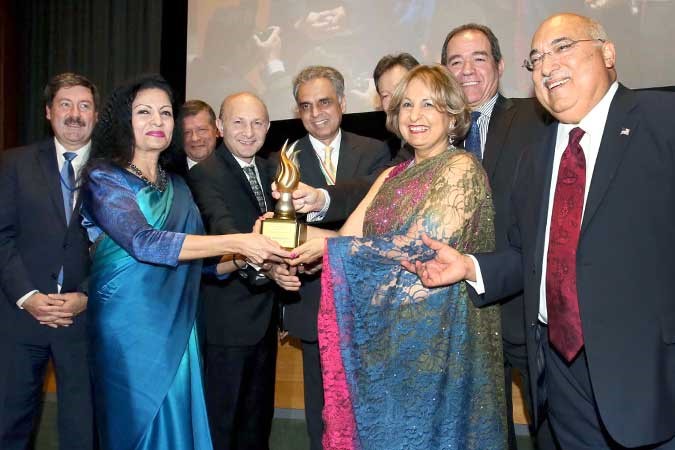
in ensuring the adoption of a dedicated goal on gender equality and women’s empowerment
(SDG 5) within the Sustainable Development Goals, and championship of the cause, December
11, 2017 Photo /Jay Mandal
But sexual harassment in work place is very pervasive. It is challenging to women who are coming out and participating in different sectors of political life and professions. So, all these stories are now coming out like “metoo” movement.
TIP: I concur with what you are saying but centuries old cultural, social and patriarchal norms take time to change. Compared to US, there are not many women rising to top in Punjab or Africa. How tough do you think your ground is whether in Punjab or Africa?
AMB: Well, cultural,social, and patriarchal norms are critical and that is why we believe in movement building. and that is why I believe govt. of India’s – bibi bachao, beti padhao – unless you start building culture and social norms around valuing the girl child that she is of equal value and also you dismantle all the patriarchal institutions and norms that devalue the child and aversion to the girl child, you are not going to get any change. So, movement building has to be done. This movement building has been going on through village councils. UN women has been working in India through women village councilors and zilla parishad councilors. Because they have got elected on quota and there are 1.5 million women councilors who are acting as staff. What we have do is to work with them, train them and demand rights and public services from authorities and also implementation of the programs that have been approved, money to be spent on programs that have been approved. So, our governance program is very successful program.
Women’s economic empowerment, access to energy and water and sanitation are really important. But you have to target gender equality when you target these programs. And equally these programs will benefit gender equality in return. For example, the jan-dhan program, the access to finance, women’s disadvantage in terms of owning property, lands and in Punjab this is prevalent in spite of having a law that prevents it and also to disincentivize the discrimination. So effective laws and policies and their effective implementation, movement building, and youth have to be part of all this.
On the youth side, we have this LEAP program – Leadership, empowerment, action and prevention of violence against women and partnership with women’s organization, young men’s organization and intergenerational dialog. So that is the youth part.
We are very successful in our “he or she” programs. men and boys have to be made champions of gender equality. Women have to stand up for their rights. I have seen in India women are transmitting harmful, discriminatory patriarchal norms. So social transformation by women themselves is important. but men and boys have to be taught from the beginning.

TIP:That is where the problem is. When there are many women in the family, only then men are sensitive to feminist issues.
AMB:Yes, it has to begin when youare a boy. Every father and mother must bring up their children in a gender equal way. Boys must learn in their textbooks in the way their teachers teach them about how women and girls are lower in dignity. The other day PM Modi said in “swacha Bharat abhiyan” – he talked about how everybody in the house leaves the woman to do the cleaning work. Why? It should be the responsibility of each one. So that kind of new culture respecting the dignity and equal rights of women has to be developed. Education is an important part, but prevention, protection, prosecution of perpetrators, ending violence against women and provision of multisectoral services- in all of that again, changing mindset and educating from the beginning is needed. We are now dealing with generations of people who have grown up on gender unequal basis and mindset that have stereotypes. So, we have to change that and to change that we have to work with them. and we have been working with them.
90% of the world is governed by men leaders and they are leading from the front. You asked about Africa. We have worked with tribal leaders, advocating and championing. It has been successful.
Faith is another important thing. In Sikhism, women are always seen as equal. And, what has happened now? it is with all other religions including Hindus that we worship them on one side and on the other, we devalue them.
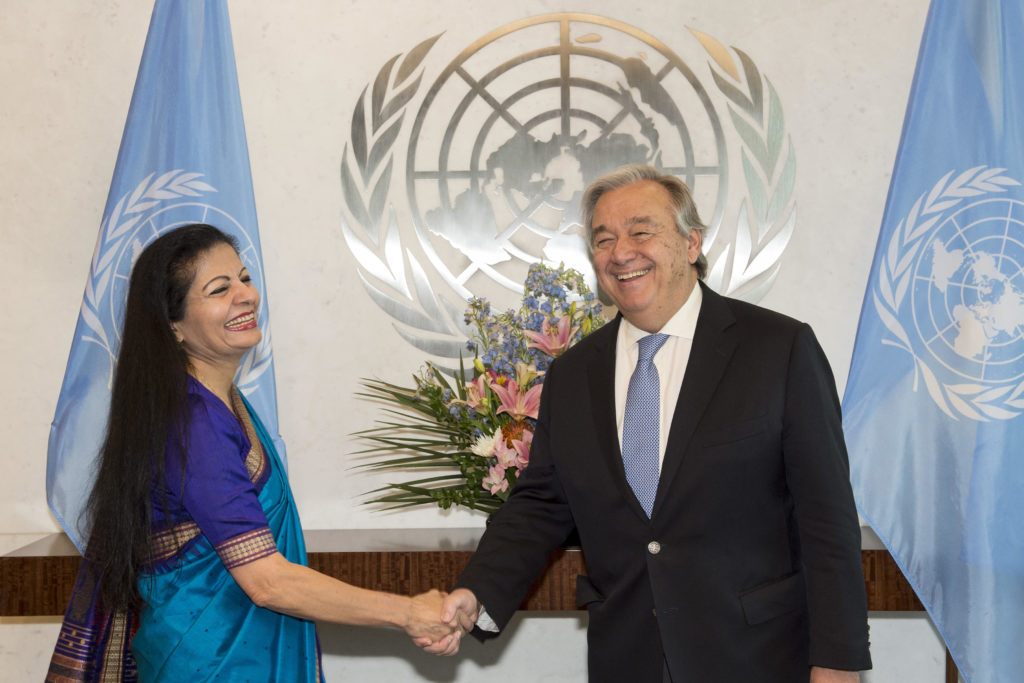
In order to build 50/50 progress by 2030, we have to take some measures. We are leading not only in India but many parts of the world, “Gender parity Democracy” movement.
TIP: Do you think, likereservation system, we should have a similar system in political and corporate world?
AMB: I entirely advocate what is in the Beijing platform and what is in the convention for ending all forms of discrimination against women. There is a rule for special temporary measures. it is not that these measures will be there forever, but when you levelthe playing field, you need some special measures to take those who are at the position of disadvantage now to the position of equality and once that has been achieved, then those measures will become irrelevant. So thatis what we should aspire for.
Now to your question, even before going to corporate, we have been advocating, and achieved constitutional amendments in many countries whereby quotas have been set for parliaments but not yet in India.We are strongly advocating for “reservation bill” in India. There are electoral system challenges and diverse community cultures, but we are advocating reservation bill strongly and parliamentary seats for women for some time. I remember one case in a village panchayt near Jaipur when she stated that she was first nominated and now she defeated 15 other contestants on her own strength. She said people voted for her because she delivered -“I built roads, got schools opened, got projects opened”.
It is not only women and girls that we do reservation for; it is for good governance.
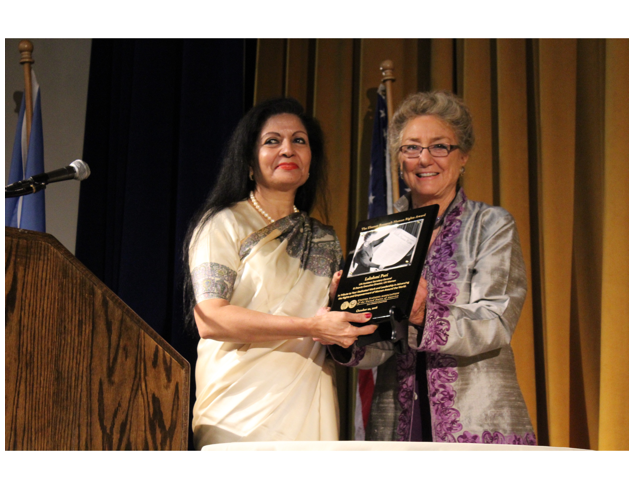
TIP: So those girls are advocating requirements for themselves.
AMB: So, you need to bring us up to a level when we don’t need any more help and also to a point where people recognize women’s equal participation in governance.
That brings me to the corporate world. It is a major challenge. There are many countries – like Norway – that have special measures which state that any company that wants to be listed on stock exchange has to have 50 percent women on board. China and Japan are also working towards having women board members. So, it is a mandatory movement. There are movements in India, European union and Germany as well.
In Australia, women owned business companies are given certain preferences. These kinds of incentives build women’s management and governance capacity in the corporate sector as well.
So, you need some measures to achieve that.
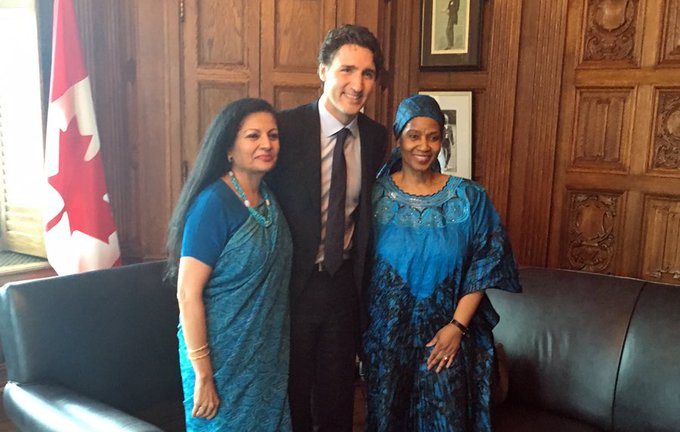
TIP: Even though India had Lady PM and President in politics, what about corporate sector?
AMB: We have women CMs, ministers etc. We are taking many steps but not enough.This is a very slow progress. In order to build 50/50 progress by 2030, we have to take some measures.We are leading not only in India but many parts of the world, “Gender parity Democracy” movement.
We have great women’s movement in India, many NGO leaders are women.
As UN organization, we have our first MOU with NYC and we have partnership program on all aspects of gender equality. Like NYC, we are working with many cities in in the world. We also have safe and sustainable cities program which include 66 cities in the program and India has about 8 or 9 cities that participates in the gender equality program which includes many areas like transport, business etc.
Regarding your earlier question on women, apart from this norm setting and movement building, one major project has been how to build a knowledge hub. we want to bring out the facts for a “gender statistics revolution”.
We need to know and bring out what is happening with women and girls – whether economic empowerment, violence etc. and we have this program called “making women and girls count”.
India is a pathfinder country. There are about now 20 countries that participating in this program. Now social media is also helping in that – gender statistics revolution.
We need to bring out the facts to make people outreach to bring about the emancipation of women. As Swami Vivekananda said -“arise, awake and stop not” – this whole knowledge is important and that is the basis of the revolution.
TIP: Is there a time frame for that?
AMB:We have set a time-frame of 2030. That is why the slogan is – “planet 50/50 by 2030”. We are asking every country to step up.
We are very strapped and under-resourced. Original target was 1 billion, then it became 500 million and now we are struggling to reach 300 million. It has been a big challenge. We have tried to raise from philanthropist and private sectors, including India. We are doing everything, but governments are not forthcoming.
TIP: Just like any country that violates UN resolutions, are there any sanctions for the country that violates the gender equality?
AMB: UN women is intergovernmental organization. There are no sanctions that can be placed but we work with every country to make them speed up the gender equality. In UAE we have opened an office. We are having dialog with Saudi Arabia and we have a very strong Arab office in Egypt that oversees all of the Arab world.
We are working in conflict countries, natural disasters, refugee countries, we are working on humanitarian response and resiliencebuilding, making sure that whateverhumanitarianresponse is provided, there is a very strong focusing on differential and disproportionate response on women as they are more prone to exploitation.
TIP:Regrading your 2030 target, do you think your organization needs more resources and extra power to meet the target?
AMB: Absolutely. This has been one of my regrets that the international community has been very strong in committing in terms of norms and standards to women’s empowerment and gender equality, they have not setup institutions to take this forward. So, the financial commitment part has not been commensurate with declared political commitment. We are very strapped and under-resourced.
Original target was 1 billion, then it became 500 million and now we are struggling to reach 300 million. It has been a big challenge. We have tried to raise from philanthropist and private sectors,including India. We are doing everything, but governments are not forthcoming.
“Making Women and children count” is supported by Gates Foundation.
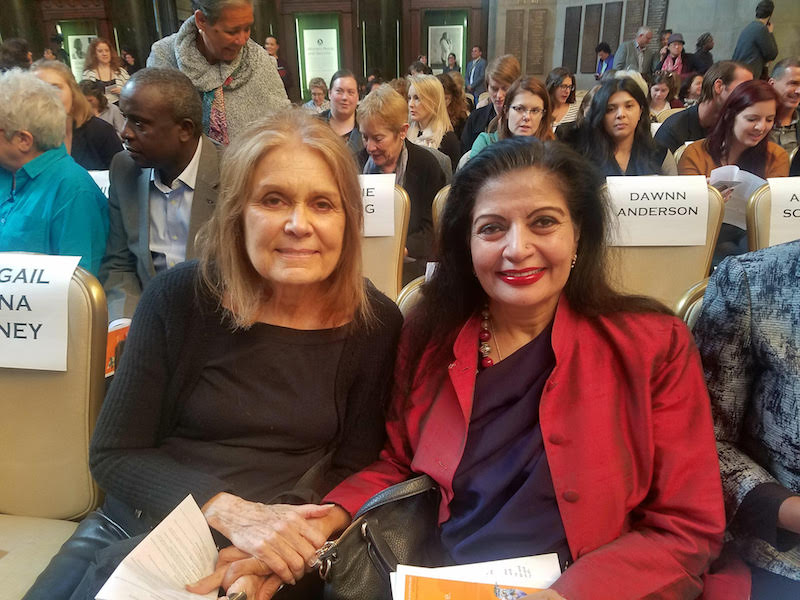
I would like all women to come forward and claim their rights which are equal to all the men and boys. And to all men and boys, join the gender equality cause, because this is not only good for your mothers, sisters, colleagues etc.; it is good for you.
TIP: US president has decided to cut back funding for UN. So, are you also affected?
AMB: No, we were in fact very happy that in 2017 contribution from US increased by a million.
TIP: What about now?
AMB: In 2017 US govt. gave 8.5 million, 1 million more than the previous year.
TIP:How is India performing?
AMB: India, from the inception, has played a very stellar role and they are the only country contributing 1 million every year.
TIP:One last question. Your husband, Mr. Hardeep Singh Puri has been a wonderful diplomat. Now that he has chosen to go into politics, how do you look at the new avatar of your husband.
AMB: He always wanted to be in politics. He was in politics during his student days. He always wanted to break out of his civil service mantle and go into politics. After retirement, he chose to go into politics. I am very happy that he has assumed the role of minister for urban and housing development which is very critical in order to achieve all the 17 goals of sustainable development and he has my full support.
TIP: Before we close, would you like to say something to The Indian Panorama readers?
AMB: I would like all women to come forward and claim their rights which are equal to all the men and boys. And to all men and boys, join the gender equality cause, because this is not only good for your mothers, sisters, colleagues etc.; it is good for you.



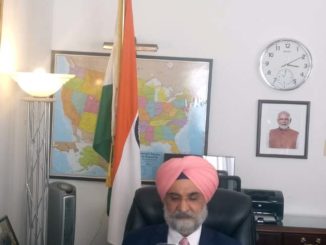

Be the first to comment